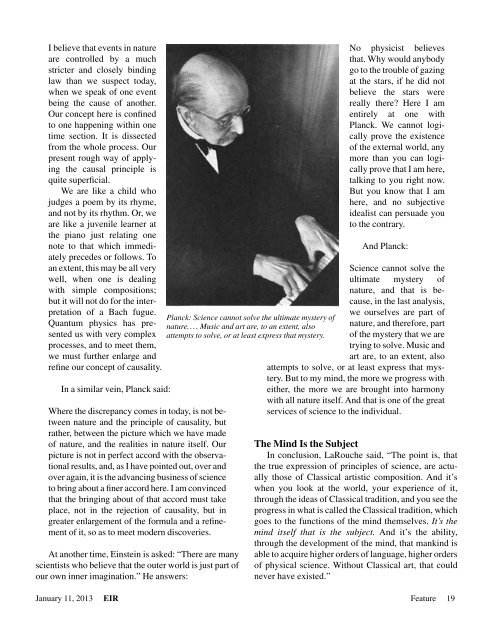Einstein and Planck: Classical Music and Scientific Discovery
Einstein and Planck: Classical Music and Scientific Discovery
Einstein and Planck: Classical Music and Scientific Discovery
Create successful ePaper yourself
Turn your PDF publications into a flip-book with our unique Google optimized e-Paper software.
I believe that events in nature<br />
are controlled by a much<br />
stricter <strong>and</strong> closely binding<br />
law than we suspect today,<br />
when we speak of one event<br />
being the cause of another.<br />
Our concept here is confined<br />
to one happening within one<br />
time section. It is dissected<br />
from the whole process. Our<br />
present rough way of applying<br />
the causal principle is<br />
quite superficial.<br />
We are like a child who<br />
judges a poem by its rhyme,<br />
<strong>and</strong> not by its rhythm. Or, we<br />
are like a juvenile learner at<br />
the piano just relating one<br />
note to that which immediately<br />
precedes or follows. To<br />
an extent, this may be all very<br />
well, when one is dealing<br />
with simple compositions;<br />
but it will not do for the interpretation<br />
of a Bach fugue.<br />
Quantum physics has presented<br />
us with very complex<br />
processes, <strong>and</strong> to meet them,<br />
we must further enlarge <strong>and</strong><br />
refine our concept of causality.<br />
In a similar vein, <strong>Planck</strong> said:<br />
Where the discrepancy comes in today, is not between<br />
nature <strong>and</strong> the principle of causality, but<br />
rather, between the picture which we have made<br />
of nature, <strong>and</strong> the realities in nature itself. Our<br />
picture is not in perfect accord with the observational<br />
results, <strong>and</strong>, as I have pointed out, over <strong>and</strong><br />
over again, it is the advancing business of science<br />
to bring about a finer accord here. I am convinced<br />
that the bringing about of that accord must take<br />
place, not in the rejection of causality, but in<br />
greater enlargement of the formula <strong>and</strong> a refinement<br />
of it, so as to meet modern discoveries.<br />
At another time, <strong>Einstein</strong> is asked: “There are many<br />
scientists who believe that the outer world is just part of<br />
our own inner imagination.” He answers:<br />
<strong>Planck</strong>: Science cannot solve the ultimate mystery of<br />
nature. . . . <strong>Music</strong> <strong>and</strong> art are, to an extent, also<br />
attempts to solve, or at least express that mystery.<br />
No physicist believes<br />
that. Why would anybody<br />
go to the trouble of gazing<br />
at the stars, if he did not<br />
believe the stars were<br />
really there? Here I am<br />
entirely at one with<br />
<strong>Planck</strong>. We cannot logically<br />
prove the existence<br />
of the external world, any<br />
more than you can logically<br />
prove that I am here,<br />
talking to you right now.<br />
But you know that I am<br />
here, <strong>and</strong> no subjective<br />
idealist can persuade you<br />
to the contrary.<br />
And <strong>Planck</strong>:<br />
Science cannot solve the<br />
ultimate mystery of<br />
nature, <strong>and</strong> that is because,<br />
in the last analysis,<br />
we ourselves are part of<br />
nature, <strong>and</strong> therefore, part<br />
of the mystery that we are<br />
trying to solve. <strong>Music</strong> <strong>and</strong><br />
art are, to an extent, also<br />
attempts to solve, or at least express that mystery.<br />
But to my mind, the more we progress with<br />
either, the more we are brought into harmony<br />
with all nature itself. And that is one of the great<br />
services of science to the individual.<br />
The Mind Is the Subject<br />
In conclusion, LaRouche said, “The point is, that<br />
the true expression of principles of science, are actually<br />
those of <strong>Classical</strong> artistic composition. And it’s<br />
when you look at the world, your experience of it,<br />
through the ideas of <strong>Classical</strong> tradition, <strong>and</strong> you see the<br />
progress in what is called the <strong>Classical</strong> tradition, which<br />
goes to the functions of the mind themselves. It’s the<br />
mind itself that is the subject. And it’s the ability,<br />
through the development of the mind, that mankind is<br />
able to acquire higher orders of language, higher orders<br />
of physical science. Without <strong>Classical</strong> art, that could<br />
never have existed.”<br />
January 11, 2013 EIR Feature 19

















